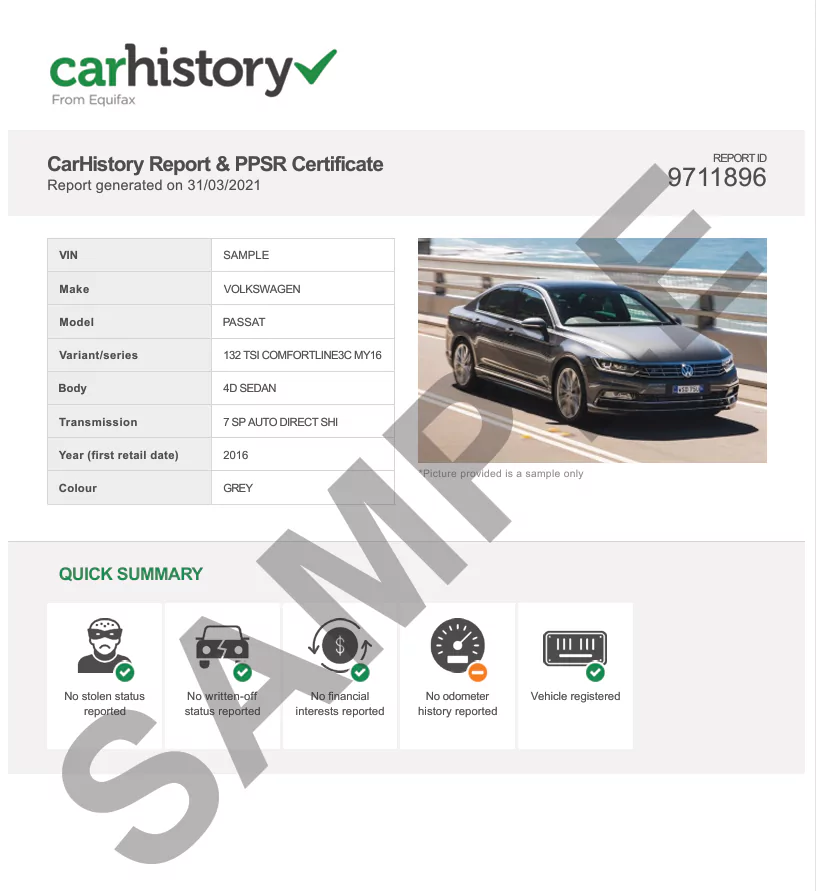

Understanding Car History Reports: A Guide to Smart Used Car Buying
A car history report is a comprehensive document detailing a used vehicle’s reported history right here in Australia. Think of it as a background check for a car, providing a deeper insight than just a visual inspection. It’s an incredibly important tool that provides transparency and helps savvy buyers steer clear of “lemons” – used vehicles for sale that might have undisclosed damage, finance owing, or other hidden problems that could lead to significant headaches and expenses down the track. Crucially, in Australia, these reports often include a Personal Property Securities Register (PPSR) check (formerly known as REVS), offering vital information about the car’s financial and legal status, such as whether there’s still money owing on it or if it’s been written off.
What’s in an Australian Car History Report?
Here’s a more in-depth look at the information you can typically find in a car history report in Australia:
-
PPSR Check (Financial Liability):
- Encumbrance Details: This section is paramount. It will clearly state if there is any outstanding finance (a loan) secured against the vehicle. If you purchase a car with existing finance, the finance company could legally repossess it, even if you’ve paid the seller.
- Security Interests: It can also reveal other registered security interests, though finance is the most common concern for car buyers.
- Peace of Mind: A clear PPSR check provides significant peace of mind, ensuring you’re not inheriting someone else’s debt.
-
Written-Off Status:
- Statutory Write-Off: This means the vehicle has been deemed so severely damaged (e.g., major accident, flood damage beyond repair) that it can never be registered for road use again in Australia. Buying a statutory write-off is generally ill-advised.
- Repairable Write-Off: These vehicles have sustained significant damage but can be repaired and re-registered, subject to strict inspection processes in each state or territory. Be wary of repairable write-offs as they may have underlying structural issues and could be more difficult and costly to insure or resell.
- Understanding the Risk: Knowing the write-off status helps you assess the potential risks and limitations associated with the vehicle.
-
Stolen Status:
- National Database Check: The report checks against national databases of stolen vehicles.
- Legal Ramifications: Purchasing a stolen vehicle can lead to its confiscation by authorities, and you will likely lose any money you paid for it.
- Verification is Key: This check helps protect you from unknowingly becoming involved in illegal activity.
-
Odometer Readings:
- Trend Analysis: The report provides a chronological list of recorded odometer readings from various points in the vehicle’s history (e.g., registrations, services).
- Detecting Rollback: By reviewing the trend, you can identify inconsistencies or sudden drops in mileage, which could indicate odometer tampering – a form of fraud designed to make a car appear to have lower mileage than it actually does.
- Wear and Tear Indicator: Accurate odometer readings give you a better understanding of the vehicle’s actual wear and tear.
-
Accident and Damage History:
- Reported Incidents: This section details accidents that have been officially reported to insurance companies or government agencies.
- Severity Indicators (Often Limited): While the report might mention the severity (e.g., minor, major), detailed information about the extent of the damage is often not included.
- Airbag Deployment: Some reports may indicate if airbags were deployed in a reported accident, suggesting a more significant impact.
- Unreported Damage: Remember that minor accidents or damage repaired privately may not appear here. A thorough physical inspection is still crucial.
-
Title Information:
- Chain of Ownership: Shows the legal history of the vehicle’s ownership.
- Branding: Will highlight if the title has ever been branded as “salvage” or “repairable write-off.”
- Clarity of Ownership: Ensures there are no legal disputes or encumbrances on the vehicle’s ownership (beyond those listed in the PPSR check).
-
Previous Owners:
- Number of Keepers: Indicates how many different individuals or entities have owned the vehicle.
- Usage Clues: Knowing if it was a rental car or part of a fleet might give you clues about the type of use and potential wear and tear it has experienced.
- Longevity of Ownership: A car with few previous owners might suggest it was well-cared for by long-term keepers.
-
Registration Details:
- Current Status: Confirms if the vehicle is currently registered and in which state or territory.
- Registration History: May show past registration details and any periods where the vehicle was unregistered.
-
Vehicle Identification Number (VIN) Check:
- Uniqueness Verification: Confirms the 17-digit VIN is legitimate and hasn’t been tampered with.
- Cross-Referencing: Ensures the VIN on the report matches the VIN plate on the vehicle itself.
- Theft Deterrent: Helps identify potentially stolen or “rebirthed” vehicles (where the identity of a severely damaged or stolen car is transferred to another vehicle).
-
Build and Compliance Plate Information:
- Factory Specifications: Provides details about the car’s original manufacturing specifications, such as the engine type and transmission.
- ADR Compliance: Confirms the vehicle met Australian Design Rules at the time of manufacture.
-
Sales History:
- Market Insights: Can give you an idea of the car’s pricing history and how it has depreciated over time.
- Time on Market: Might indicate how long the car has been for sale recently.
-
ANCAP Safety and Emission Ratings:
- Safety Assessment: Provides an independent assessment of the vehicle’s safety features and crashworthiness.
- Environmental Performance: Shows the vehicle’s emissions ratings, which can be relevant for environmental considerations and potential future regulations.
-
Recall Information:
- Safety Notices: Lists any outstanding safety recalls issued by the manufacturer. These are critical safety issues that need to be addressed by a dealership free of charge.
- Proactive Safety: Checking for recalls ensures any potential safety defects are rectified.

Why is Understanding a Car History Report Important for Buyers?
-
Avoiding Financial Risk:
- Lenders in Australia who register their interest on the PPSR have a legal claim over the vehicle until the loan is fully repaid. If you buy a car with outstanding finance and the seller defaults, the lender can repossess the vehicle, leaving you without the car and the money you paid.
- A PPSR check acts as a crucial safeguard, revealing any existing financial encumbrances before you commit to the purchase.
- Knowing about outstanding finance allows you to make informed decisions, potentially negotiating with the seller to clear the debt before the sale or adjusting the price accordingly.
-
Safety Concerns:
- Vehicles that have been declared a statutory write-off are deemed too severely damaged to be safely repaired and legally re-registered for road use in most Australian states. Purchasing such a vehicle can put your safety at significant risk.
- Repairable write-offs, while legally allowed back on the road after inspection, may still have underlying structural weaknesses or damage that could compromise their safety in a future accident. A history report flags these vehicles, prompting further investigation.
- Accident history, even for vehicles not written off, can indicate prior damage that may not have been repaired to a high standard, potentially affecting the car’s handling and safety features.
-
Preventing Odometer Fraud:
- Odometer tampering is a deceptive practice that misrepresents the true mileage of a vehicle, making it appear to have less wear and tear than it actually does. This can lead to you overpaying for the car and facing unexpected maintenance issues sooner than anticipated.
- A car history report compiles recorded odometer readings from various sources, allowing you to identify inconsistencies or suspicious drops in mileage that could indicate fraud.
-
Making Informed Decisions:
- A comprehensive car history report provides a consolidated view of the vehicle’s past, including its ownership history, accident records, and any significant events. This information empowers you to assess the overall condition and potential risks associated with the vehicle.
- By understanding the car’s background, you can make a more informed decision about whether the asking price is fair and whether the vehicle meets your needs and expectations for reliability.
-
Negotiating Price:
- Negative information revealed in a car history report, such as a history of accidents, a high number of previous owners, or a less-than-ideal past use (e.g., rental car), can provide you with valid reasons to negotiate a lower selling price.
- Being aware of these factors allows you to argue for a price that more accurately reflects the vehicle’s history and potential future costs.
-
Peace of Mind:
- Purchasing a used car can be a significant investment, and the uncertainty about its past can be stressful. A clean car history report, with no red flags, can provide you with greater confidence and peace of mind in your purchase.
- Knowing that the vehicle has a clear title, no outstanding finance, and no history of major accidents or theft can reduce the risk of encountering costly and unpleasant surprises down the road.
How to Read and Interpret Key Sections of a Car History Report
-
PPSR/Finance Section:
-
“No Encumbrance Found” or similar clear statements: This is the ideal scenario, indicating no registered financial interests.
- Details of Encumbrance: If an encumbrance is listed, note the secured party and the date the interest was registered. This requires further action to ensure the debt is settled before you buy.
- Multiple Encumbrances: Be extremely cautious if multiple security interests are recorded.
-
-
Written-Off/Stolen Section:
- “Not Recorded as Written-Off” and “Not Recorded as Stolen”: This is the desired outcome.
- Write-Off Category: Pay close attention to the type of write-off (statutory or repairable) as it has significant implications for registration and insurability.
- Date of Incident: Note when the vehicle was written off or stolen, as this can give context to its history.
-
Odometer History:
- Chronological Sequence: Ensure the readings increase steadily over time.
- Mileage Jumps or Drops: Investigate any significant discrepancies. Request service records or other documentation to verify the mileage.
- Average Yearly Mileage: Consider if the average yearly mileage is consistent with the car’s age and likely use.
-
Accident/Damage History:
- Number and Dates of Accidents: A higher number of accidents might suggest a higher risk vehicle.
- Severity Indicators (if provided): Understand the terms used to describe the severity (e.g., minor, moderate, severe).
- Consider Unreported Damage: Remember that not all accidents are reported. A thorough pre-purchase inspection is still essential.
-
Title History:
- “Clean Title”: The standard and preferred status.
- “Repairable Write-Off” / “Salvage Title” / “Rebuilt Title”: These indicate significant past damage and may come with registration and insurance limitations. Understand the specific regulations in your state.
- Frequent Title Transfers: A car that has changed hands frequently in a short period could have underlying issues.
-
Ownership History:
- Number of Owners: A very high number of owners for a relatively young car might raise questions about its reliability or desirability.
- Type of Owner (if available): Knowing if it was a rental or fleet vehicle can provide insights into its usage patterns.
-
Recalls:
- List of Recalls: Note any outstanding recalls listed on the report.
- Status of Recalls: Ideally, the report should indicate if the recalls have been completed. If not, factor in the time and effort to have them addressed. You can also verify recall status on the manufacturer’s website using the VIN.
Where to Obtain Car History Reports in Australia
- CarHistory (NRMA/Equifax): A leading provider offering comprehensive reports that include PPSR checks, accident history, odometer readings, stolen status, and more. They often draw data from various government and industry sources.
- PPSR (Personal Property Securities Register): The official Australian government register. You can perform basic VIN searches to check for security interests (finance), and whether the vehicle has been reported stolen or written off. Basic checks are often free, while official certificates incur a small fee.
- AUCN Car Report: Another third-party provider claiming to offer comprehensive reports at a competitive price, including data from PPSR, Austroads, and other sources.
- ChecknBuy: Partners with CarHistory to provide reports that include PPSR checks, accident history, odometer readings, and more. They sometimes offer discounts on pre-purchase inspections.
- Budget Direct (Free PPSR Check): Offers a free basic PPSR check, providing information on finance owing, stolen status, and write-off history. Note that this might be less comprehensive than paid reports.
- Other Third-Party Providers: Numerous other companies offer car history reports. Search online for “car history report Australia” to find more options and compare their offerings. Look for reviews and compare the data sources they claim to access.
Limitations of Car History Reports:
- Reliance on Reported Data: Reports are only as accurate and complete as the information that has been officially reported to the databases they access. Events that weren’t reported (e.g., minor private accidents, cash-in-hand repairs) won’t appear.
- Data Lag: There can be delays in information being updated on the relevant databases. A recent accident or write-off might not show up immediately on a report.
- Varied Data Coverage: Different report providers may have access to different data sources, leading to variations in the comprehensiveness of their reports. Compare what each report includes.
- No Insight into Maintenance History (Usually): While some reports might include limited service information, they generally don’t provide a detailed maintenance history. Always ask for service logbooks from the seller.
- Doesn’t Assess Current Condition: A car history report provides historical data but offers no insight into the car’s current mechanical or physical condition. A pre-purchase inspection by a qualified mechanic is essential for this.
- Not a Guarantee: A clean car history report doesn’t guarantee a problem-free car. Hidden issues can still exist.
Key Takeaway: Always use a car history report as one part of your due diligence when buying a used car. Supplement it with a thorough physical inspection and a professional pre-purchase inspection for a more complete picture of the vehicle’s condition and history.
Conclusion: Empowering Your Used Car Purchase
Understanding car history reports, particularly the crucial PPSR check, is no longer optional but an essential step in the used car buying process across Australia. Investing in a comprehensive report provides invaluable insights into a vehicle’s past, arming you with the knowledge to make a confident and informed decision. By uncovering potential financial risks, safety concerns, or hidden issues, you significantly reduce the chances of purchasing a problematic vehicle. Remember to always combine the findings of a car history report with a thorough physical inspection to gain a complete and accurate assessment of your potential new ride.
Your Journey Starts Here: Explore Quality Used Cars at Alpha Autos
Ready to embark on your next adventure with a reliable used car? Alpha Autos offers a wide selection of quality pre-owned vehicles to suit various needs and budgets. We encourage informed purchasing decisions and can often provide car history reports for our vehicles. Our team is here to guide you through the process and help you find the perfect car with confidence. Browse our current inventory online or visit Alpha Autos today to discover your ideal used car and start your journey!
Categories
- Auto Detailing (2)
- Car Buying Guide (14)
- Car Financing (1)
- Car Maintenance (2)
- Car News (2)
- Used Cars For Sale (1)
Recent Posts
Related posts


Why the Honda Civic is a Great Used Car Choice

Questions to Ask When Inspecting a Used Car





